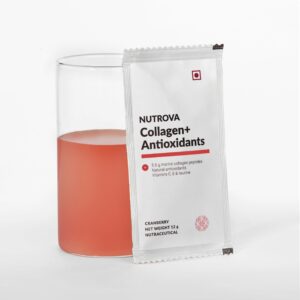When we talk about skin ageing, we really talk about collagen—or, more specifically, lack of it. Almost every attractive feature of healthy skin is linked to the content of collagen-the more of this protein we have, the firmer, plumper and juicier our skin looks.
But as one ages — and particularly, as people smoke, drink, and get UV exposure, their collagen output decreases, and the collagen we already have starts to break down. This causes wrinkles and loss of plumpness or fullness. Addressing these symptoms requires addressing the loss of collagen in one way or another.
To that end, there is a slew of collagen-rich products on the market, most of which fall into one of two categories: moisturizers (especially creams) and oral supplements.
While our skincare needs to improve over time, it’s never too early to start using products that help avoid fine lines and wrinkles. One of the easiest ways to make the skin look smooth and supple is to use collagen-enhancing products.
YOU MAY LIKE TO READ: Try These Korean Skincare Routines To Get Radiant Skin
Now the question is how important is collagen for your health?
Akshay Pai, Founder & CEO, Nutrova shares some key points about collagen supplements- its benefits and myths regarding the use of it.
Benefits of collagen supplements
Collagen or collagen peptide supplements refer to dietary supplements that consist of hydrolyzed or broken-down collagen.
Collagen is a structural protein that is found in our skin, bones, joints and our digestive tract, and is the single most abundant protein in our bodies.
The collagen in our body constantly undergoes damage due to wear and tear (particularly in our joints), external conditions such as UV radiation from the sun (in our skin) and even as a result of certain lifestyle choices such as smoking or a high-sugar diet.
While our body can make collagen on its own to repair the damage, its ability to produce new collagen slows down as we age, which leads to a build-up of damage over time.
Collagen or collagen peptide supplements refer to dietary supplements that consist of hydrolyzed or broken down, collagen. Unlike other proteins, collagen peptides of a particular size can be absorbed directly without further digestion. Research has shown that supplementing a diet with collagen peptides can improve our body’s ability to produce collagen. The benefits of collagen peptide supplements are noticeable all over the body, and include:
- Improving skin hydration, firmness and elasticity
- Decreasing skin roughness and wrinkle width
- Reducing joint discomfort (pain) and improved joint flexibility
- Increasing bone density and bone and muscle strength
- Strengthening and supporting the gut lining

In addition to taking collagen supplements, integrating collagen enhancing products into your skincare routine, such as Nutrova Collagen+Antioxidants will help increase the development of collagen, minimize the appearance of fine lines and wrinkles and restore more youthful-looking skin.
Common myths regarding collagen supplements include:
- Vegetarian collagen supplements: While researchers are working on complex cell culture-derived processes to develop vegetarian collagen, there is currently no vegetarian collagen supplement in the market today. All collagen peptide supplements available today are derived from animal sources.
- Collagen peptides are an instant solution to skin problems: Collagen peptides work by giving your body the building blocks it needs to produce new collagen. This process takes time, and results are most commonly visible in a minimum of 4 to 8 weeks.
- All collagen peptide supplements are created equal. Collagen peptides need to be consumed at a certain dose to be effective. Most studies have shown doses of 5 grams or more to be most effective, particularly for skin and joint health. Smaller doses, commonly found in capsules, would not be sufficient to provide the full benefit.
- Benefits vary based on the source: Collagen peptides are, by definition, broken down pieces of collagen. While the larger collagen proteins vary slightly between sources (marine, bovine, etc.), once they are broken down into the effective size, there is practically no variation between different ‘types’ of collagen peptide supplements.











